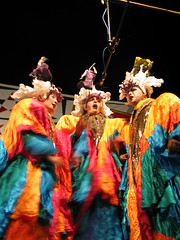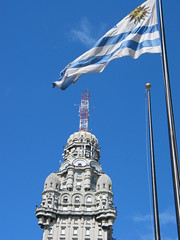It's that time of year again. Spring isn't here just yet (it's still rainy and cold), but the arrival of Girl Scout cookies means that the days will soon be warmer. It also means summoning incredible willpower and just saying "no" to the thin mints and samoas taunting me from my top desk drawer.
Apparently, I'm not the only one mustering the willpower. Allison sent me this hilarious commentary from NPR on the topic: Finding Binge Absolution in a Do-Si-Do.
Knowing myself, it's time for me to put the boxes in an interoffice mail pouch and send them to the IT guys who routinely save my ass during the course of the working year. If I don't, I'll just spend the next three days eating them, two cookies at a time.
mercredi, février 28, 2007
mardi, février 27, 2007
only in america
I've always thought that TV sucked the life out of you ...
Mummified body found in front of blaring TV
NEW YORK (Reuters) -- Police called to a Long Island man's house discovered the mummified remains of the resident, dead for more than a year, sitting in front of a blaring television set.
The 70-year-old Hampton Bays, New York, resident, identified as Vincenzo Ricardo, appeared to have died of natural causes. Police said on Saturday his body was discovered on Thursday when they went to the house to investigate a report of a burst water pipe.
"You could see his face. He still had hair on his head," Newsday quoted morgue assistant Jeff Bacchus as saying. The home's low humidity had preserved the body. (Watch for views inside the house and why no one ever bothered to check on himVideo)
Officials could not explain why the electricity had not been turned off, considering Ricardo had not been heard from since December 2005.
Neighbors said when they had not seen Ricardo, who was diabetic and had been blind for years, they assumed he was in the hospital or a long-term care facility.
lundi, février 26, 2007
purging the undesirables
I went to a school where the Greek/ Panhellenic system was pretty much a joke. There was no on-campus housing for the Greek system, and less than 20% of the student body actually participated in fraternties or sororites. Although I have a few friends who were in them at other schools, the vast majority of my friends are pretty anti-Greek/ Panhellenic system.
This story epitomizes all that is wrong with this system. The national organization's assertion (that brainy, diverse women create a negative stereotype of a sorority that contributed to a decline in membership, or at least the kind of members it preferred) neatly sums up why I never had any interest in belonging to this kind of organization.
I just hope the young women who were purged have the good sense to see that sisterhood and self esteem have nothing to do with garnering the approval of a bunch of Stepford Women.
This story epitomizes all that is wrong with this system. The national organization's assertion (that brainy, diverse women create a negative stereotype of a sorority that contributed to a decline in membership, or at least the kind of members it preferred) neatly sums up why I never had any interest in belonging to this kind of organization.
I just hope the young women who were purged have the good sense to see that sisterhood and self esteem have nothing to do with garnering the approval of a bunch of Stepford Women.
Sorority Evictions Raise Issue of Looks and Bias
By SAM DILLON
February 25, 2007
GREENCASTLE, Ind. — When a psychology professor at DePauw University here surveyed students, they described one sorority as a group of “daddy’s little princesses” and another as “offbeat hippies.” The sisters of Delta Zeta were seen as “socially awkward.”
Worried that a negative stereotype of the sorority was contributing to a decline in membership that had left its Greek-columned house here half empty, Delta Zeta’s national officers interviewed 35 DePauw members in November, quizzing them about their dedication to recruitment. They judged 23 of the women insufficiently committed and later told them to vacate the sorority house.
The 23 members included every woman who was overweight. They also included the only black, Korean and Vietnamese members. The dozen students allowed to stay were slender and popular with fraternity men — conventionally pretty women the sorority hoped could attract new recruits. Six of the 12 were so infuriated they quit.
“Virtually everyone who didn’t fit a certain sorority member archetype was told to leave,” said Kate Holloway, a senior who withdrew from the chapter during its reorganization.
“I sensed the disrespect with which this was to be carried out and got fed up,” Ms. Holloway added. “I didn’t have room in my life for these women to come in and tell my sisters of three years that they weren’t needed.”
Ms. Holloway is not the only angry one. The reorganization has left a messy aftermath of recrimination and tears on this rural campus of 2,400 students, 50 miles southwest of Indianapolis.
The mass eviction battered the self-esteem of many of the former sorority members, and some withdrew from classes in depression. There have been student protests, outraged letters from alumni and parents, and a faculty petition calling the sorority’s action unethical.
DePauw’s president, Robert G. Bottoms, issued a two-page letter of reprimand to the sorority. In an interview in his office, Dr. Bottoms said he had been stunned by the sorority’s insensitivity.
“I had no hint they were going to disrupt the chapter with a membership reduction of this proportion in the middle of the year,” he said. “It’s been very upsetting.”
The president of Delta Zeta, which has its headquarters in Oxford, Ohio, and its other national officers declined to be interviewed. Responding by e-mail to questions, Cynthia Winslow Menges, the executive director, said the sorority had not evicted the 23 women, even though the national officers sent those women form letters that said: “The membership review team has recommended you for alumna status. Chapter members receiving alumnae status should plan to relocate from the chapter house no later than Jan. 29, 2007.”
Ms. Menges asserted that the women themselves had, in effect, made their own decisions to leave by demonstrating a lack of commitment to meet recruitment goals. The sorority paid each woman who left $300 to cover the difference between sorority and campus housing.
The sorority “is saddened that the isolated incident at DePauw has been mischaracterized,” Ms. Menges wrote. Asked for clarification, the sorority’s public relations representative e-mailed a statement saying its actions were aimed at the “enrichment of student life at DePauw.”
This is not the first time that the DePauw chapter of Delta Zeta has stirred controversy. In 1982, it attracted national attention when a black student was not allowed to join, provoking accusations of racial discrimination.
Earlier this month, an Alabama lawyer and several other DePauw alumni who graduated in 1970 described in a letter to The DePauw, the student newspaper, how Delta Zeta’s national leadership had tried unsuccessfully to block a young woman with a black father and a white mother from joining its DePauw chapter in 1967.
Despite those incidents, the chapter appears to have been home to a diverse community over the years, partly because it has attracted brainy women, including many science and math majors, as well as talented disabled women, without focusing as exclusively as some sororities on potential recruits’ sex appeal, former sorority members said.
“I had a sister I could go to a bar with if I had boy problems,” said Erin Swisshelm, a junior biochemistry major who withdrew from the sorority in October. “I had a sister I could talk about religion with. I had a sister I could be nerdy about science with. That’s why I liked Delta Zeta, because I had all these amazing women around me.”
But over the years DePauw students had attached a negative stereotype to the chapter, as evidenced by the survey that Pam Propsom, a psychology professor, conducts each year in her class. That image had hurt recruitment, and the national officers had repeatedly warned the chapter that unless its membership increased, the chapter could close.
At the start of the fall term the national office was especially determined to raise recruitment because 2009 is the 100th anniversary of the DePauw chapter’s founding. In September, Ms. Menges and Kathi Heatherly, a national vice president of the sorority, visited the chapter to announce a reorganization plan they said would include an interview with each woman about her commitment. The women were urged to look their best for the interviews.
The tone left four women so unsettled that they withdrew from the chapter almost immediately.
Robin Lamkin, a junior who is an editor at The DePauw and was one of the 23 women evicted, said many of her sisters bought new outfits and modeled them for each other before the interviews. Many women declared their willingness to recruit diligently, Ms. Lamkin said.
A few days after the interviews, national representatives took over the house to hold a recruiting event. They asked most members to stay upstairs in their rooms. To welcome freshmen downstairs, they assembled a team that included several of the women eventually asked to stay in the sorority, along with some slender women invited from the sorority’s chapter at Indiana University, Ms. Holloway said.
“They had these unassuming freshman girls downstairs with these plastic women from Indiana University, and 25 of my sisters hiding upstairs,” she said. “It was so fake, so completely dehumanized. I said, ‘This calls for a little joke.’ ”
Ms. Holloway put on a wig and some John Lennon rose-colored glasses, burst through the front door and skipped around singing, “Ooooh! Delta Zeta!” and other chants.
The face of one of the national representatives, she recalled, “was like I’d run over her puppy with my car.”
The national representatives announced their decisions in the form letters, delivered on Dec. 2, which said that Delta Zeta intended to increase membership to 95 by the 2009 anniversary, and that it would recruit using a “core group of women.”
Elizabeth Haneline, a senior computer science major who was among those evicted, returned to the house that afternoon and found some women in tears. Even the chapter’s president had been kicked out, Ms. Haneline said, while “other women who had done almost nothing for the chapter were asked to stay.”
Six of the 12 women who were asked to stay left the sorority, including Joanna Kieschnick, a sophomore majoring in English literature. “They said, ‘You’re not good enough’ to so many people who have put their heart and soul into this chapter that I can’t stay,” she said.
In the months since, Cynthia Babington, DePauw’s dean of students, has fielded angry calls from parents, she said. Robert Hershberger, chairman of the modern languages department, circulated the faculty petition; 55 professors signed it.
“We were especially troubled that the women they expelled were less about image and more about academic achievement and social service,” Dr. Hershberger said.
During rush activities this month, 11 first-year students accepted invitations to join Delta Zeta, but only three have sought membership.
On Feb. 2, Rachel Pappas, a junior who is the chapter’s former secretary, printed 200 posters calling on students to gather that afternoon at the student union. About 50 students showed up and heard Ms. Pappas say the sorority’s national leaders had misrepresented the truth when they asserted they had evicted women for lack of commitment.
“The injustice of the lies,” she said, “is contemptible.”
dimanche, février 25, 2007
light and fluffy pancakes
Leo made breakfast for me yesterday, so today I returned the favor. He wanted pancakes, so I consulted "The New Best Recipe" (his Christmas gift to me) and made these. He made the bacon and squeezed some blood oranges and voila! breakfast was served.
I have to say that these are, without a doubt, the best "plain jane" pancakes I've ever eaten.
I have to say that these are, without a doubt, the best "plain jane" pancakes I've ever eaten.
2 cups buttermilk OR 1TBSP juice from 1 lemon + 2 cups milk
2 cups (10 oz) unbleached all-purpose flour
3 1/2 TBSP sugar
2 tsp baking powder
1/2 tsp baking soda
1/2 tsp salt
1 large egg
3 TBSP unsalted butter, melted and cooled slightly
1-2 tsp vegetable oilMakes about sixteen 4-inch pancakes. Serves 4 to 6.
- Whisk the lemon juice and milk together in a medium bowl or large measuring cup; set aside to thicken while preparing the other ingredients. Whisk the flour, sugar, baking powder, baking soda, and salt in a medium bowl to combine.
- Whisk the egg and melted butter into the milk until combined. Make a well in the center of the dry ingredients; pour in the milk mixture and whisk very gently until just combined (a few lumps should remain). Do not overmix.
- Heat a 12-inch skillet over medium heat for 3 to 5 minutes; add 1 tsp oil and brush to coat the skillet bottom evenly. Test skillet heat by dropping 1 TBSP (a half-dollar sized amount of batter) into the skillet. Flip it after 1 minute of cooking. If it turns golden brown, your pan is perfect. If it's still pale, the pan's not hot enough. If the pancake is dark brown and/ or has light spots from where bubbles were, the pan's too hot. Adjust accordingly.
- Pour 1/4 cup batter onto 3 spots on the skillet. Cook the pancakes until large bubbles begin to appear, 1 1/2 to 2 minutes. Using a thin, wide spatula, flip the pancakes and cook until golden brown on the second side, 1 to 1 1/2 minutes longer. Repeat with the remaining batter, using the remaining oil only if necessary. Serve immediately.
Adapted from The New Best Recipe
jeudi, février 22, 2007
have a heart
lundi, février 12, 2007
disfrutando en uruguay
We're nearing the end of our trip and have many stories to tell. For now, I'll share these images and let you make up your own narrative.
jeudi, février 01, 2007
i survived the mooninites
As Leo said: "not only is Boston giving ridiculous publicity to a show I love — they're looking like total idiots!"
Froth, fear, and fury
Cartoon devices spur antiterror sweeps; two men are arrested
By Suzanne Smalley and Raja Mishra, Globe Staff | February 1, 2007
Enraged city and state officials yesterday readied a legal assault against those responsible for a guerrilla marketing campaign that dotted the city with small battery-powered light screens, setting off fears of terrorism and shutting down major roadways and subway lines for parts of the day.
Authorities last night were retrieving the 38 magnetic signs depicting cartoon characters under bridges, on storefronts, and outside Fenway Park, among other locations, that were installed as part of a Turner Broadcasting System marketing blitz for a Cartoon Network television show.
For much of the day, police treated the signs, which measure about 1 by 1 1/2 feet and feature protruding wires on one side, as potentially dangerous. But their investigation shifted when they happened to move one of the signs into a darker area. The sudden lack of sunlight prompted the lights forming the character's image to brighten into color. Sometime between 2 and 3 p.m., according to a public safety official, a Boston police analyst recognized the image as a cartoon character, and police concluded it was likely a publicity stunt.
Turner Broadcasting System Inc. apologized about 4:30 p.m. for the campaign, which included cartoon characters making an obscene gesture.
"We really deeply regret that it was horribly misinterpreted to be a public danger, when all it was intended to do was to draw attention to a late-night television show," said Phil Kent, chairman and chief executive of the network, based in Atlanta. "This is not the kind of publicity we would ever seek."
The ordeal began around 8 a.m. when an MBTA worker spotted one of the devices affixed to an Interstate 93 ramp near Sullivan Square in Charlestown, forcing the shutdown of the northbound side of the Interstate and tying up traffic for hours. The State Police bomb squad blew the object apart with a water cannon at about 10 a.m. Then, in quick sequence just after noon, reports of similarly suspicious devices flooded police lines, sending anti terrorism forces to over a dozen locations in Boston, Cambridge, and Somerville.
Last night, in Arlington, police arrested Peter Berdovsky , 27, an artist originally from Belarus, who told the Globe earlier in the day that he installed the signs for an ad firm hired by Turner Broadcasting. Berdovsky, who described himself as " a little kind of freaked out," faces up to five years in prison on charges of placing a hoax device in a way that causes panic and disorderly conduct.
Attorney General Martha Coakley's office announced late last night that a second suspect, Sean Stevens, 28, of Charlestown, had been arrested in the case about 11:30 p.m. Like Berdovsky, Stevens was charged with placing a hoax device and disorderly conduct. Both suspects are scheduled to be arraigned at 9 a.m. today in Charlestown District Court, said Coakley's office.
Turner Broadcasting's apology did little to assuage outraged officials in the three cities, where lawyers are preparing legal efforts to recoup the cost of the police mobilization.
The deployment of scores of state, federal, and Boston police specialists, from bomb experts to terrorism analysts, exceeded $500,000, according to Boston Mayor Thomas M. Menino.
Asked last night if Turner Broadcasting would reimburse the state and cities, Kent said, "We're certainly going to look at all the facts. We're a very responsible company and we try to do the right thing."
While police responded to the episode with swiftness and gravity, some Bostonians, especially younger adults, were amused by the spectacle and suggested authorities overreacted. But Coakley said the placement of the devices, on key infrastructure points, like highway ramps and under bridges, alarmed even seasoned investigators.
"For those who responded to it, professionals, it had a very sinister appearance," Coakley said. "It had a battery behind it and wires."
Turner Broadcasting acknowledged that it never sought approval or alerted authorities that it would put up the signs. The company hired by Turner for the campaign, New York-based Interference Inc., declined comment.
The signs, installed about two weeks ago, were part of a 10-city marketing campaign for the cartoon "Aqua Teen Hunger Force." They had not set off terrorism fears in New York, Los Angeles, or any of the other locations, and it was not clear whether they had been widely noticed in those cities. Yesterday Turner Broadcasting scrambled to alert police in the other cities to their presence.
Kent described a nerve-wracking sequence of events yesterday afternoon, when he received a call from one of the company's executives saying, "Turn on CNN." The news network was at the time featuring news of the bomb scares in Boston.
The company, realizing its campaign was probably the cause, went into damage control.
A visibly angry Menino said he would ask the Federal Communications Commission to yank TBS's broadcasting license for what he called "an outrageous act to gain publicity for their product."
The "Aqua Teen" program, launched seven years ago, chronicles the adventures of a talking box of French fries and his irreverent fast food pals. The images on the signs, including the characters with grimacing faces making the obscene gesture, are tiny video game characters that make cameos on the show, which airs during the Cartoon Network's late night programming block called "Adult Swim."
Menino and others said the campaign was especially reckless given Boston's sensitivity to terrorism threats, after planes that left Logan Airport on Sept. 11, 2001, were hijacked and flown into the World Trade Center.
Menino was also upset, he said, because top executives at Turner Broadcasting did not contact him directly to discuss what happened. The mayor said he did not receive a call from the company until about 9 p.m., and it was from a low-ranking press official.
"Give me a break. . . . It's all about corporate greed," Menino said, adding that he wanted make sure "not the guy we arrested today pays, but also the people in the boardroom have some obligation also on this issue."
But others were relishing the story, which rocketed around the Internet. Computer users e-mailed their friends links to video on YouTube that showed young people using telescopic poles to place the magnetic devices on recognizably Boston locations, as electronic music played in the background. Others went to eBay, where someone was already selling one of the magnetic devices, which was apparently removed from a South Boston location, with a minimum bid of $5,000.
Local residents expressed a range of reactions. April James , 32, said she saw one of the devices in a sandy area under the Longfellow Bridge about three weeks ago. "I kicked it first, then I picked it up," said James, a hairdresser who says she walks and jogs over the bridge nearly everyday. "It looked like a bomb. I picked it up, pulled the tape off it, and there were batteries, two on the top and three on the bottom."
James said she was not frightened by the device, which she said she returned to its spot near the sidewalk in front of the bridge, before continuing her walk.
David Abel, Maria Cramer, Mac Daniel, John R. Ellement, Michael Levenson, Andrew C. Ryan, Maria Sacchetti, Donovan Slack, and Lisa Wangsness of the Globe staff and Globe correspondents April Simpson and Michael Naughton contributed to this report.
© Copyright 2007 Globe Newspaper Company.
Inscription à :
Commentaires (Atom)





